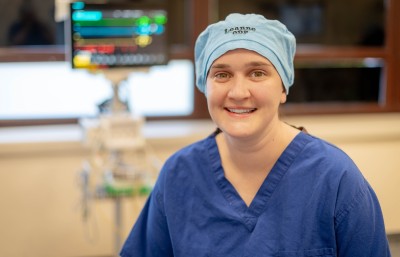Publish date: 14 May 2024

Operating Theatre Practitioners play a multi-disciplinary role within the NHS. From preparing operating rooms and equipment to assisting surgeons during procedures, their responsibilities are as diverse as they are crucial. Their roles extend to maintaining sterile environments, handling surgical instruments, and monitoring patients' vital signs throughout surgery, all while remaining calm under pressure.
Leanne Pegg, Operating Theatre Practitioner said, "I studied at Chesterfield Collage to be an ODP after experiencing being in an operating theatre whilst travelling in the Philippines. Both my parent work in the NHS so it seemed a natural career progression for me.
"My role is so varied, no day is the same. One day I could be assisting a cataract procedure then after lunch I could be in our operating theatres helping to deliver a baby during C-Section. The best part of my job is being part of multi-disciplinary teams around the hospital."
To find out more about Operating Theatre Practitioners, visit the NHS Careers Website.
An ODP falls under the umbrella of Allied Health Professionals (AHPs). There are two routes into the profession, one is the conventional route through university and the other is an apprenticeship. Both routes require GCSEs and A levels, to qualify to get onto the course. You will be expected to do both Academic work at the university and clinical placements within a hospital or a number of hospitals on a rotational basis. The course for both routes is three years, where you will come out with a qualification in Operating Department Practice and be able to register with the HCPC which is the regulatory body for the profession.